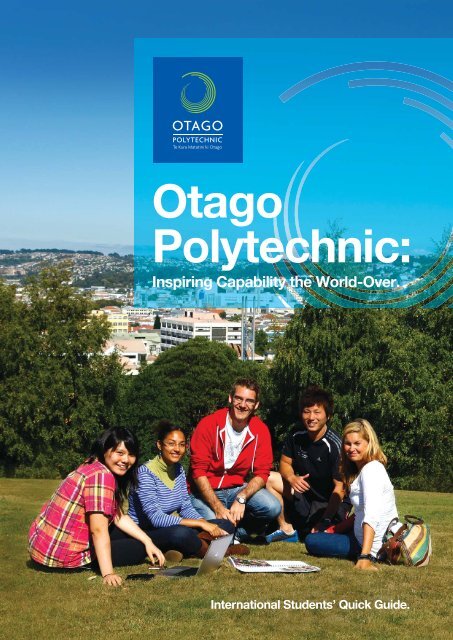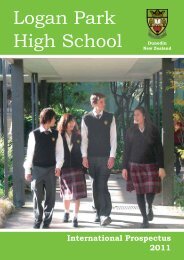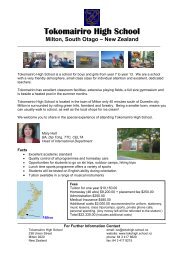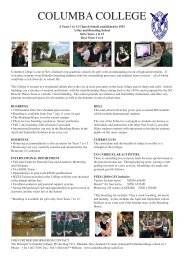Otago Polytechnic - Education Dunedin
Otago Polytechnic - Education Dunedin
Otago Polytechnic - Education Dunedin
- No tags were found...
You also want an ePaper? Increase the reach of your titles
YUMPU automatically turns print PDFs into web optimized ePapers that Google loves.
<strong>Otago</strong><strong>Polytechnic</strong>:Inspiring Capability the World-Over.International Students’ Quick Guide.
INTERNATIONAL STUDENTS’ QUICK GUIDEInset: Top – <strong>Otago</strong> <strong>Polytechnic</strong> <strong>Dunedin</strong> Campus, Bottom – Downtown <strong>Dunedin</strong>Destination <strong>Dunedin</strong>:The Student Capital of New Zealand.As the country’s premier centre of learning, <strong>Dunedin</strong> is home toa tertiary student population of 25,000. These students give thecity a special character, contributing to its vibrant and livelyatmosphere. Our <strong>Dunedin</strong> Campus lies in the heart of <strong>Dunedin</strong>’stertiary environment, surrounded by green parks, studentaccommodation, and a vibrant café culture.Nestled amongst rolling green hills, <strong>Dunedin</strong> sits at the end of abeautiful natural harbour. As the gateway to a variety of recreationalopportunities available in the <strong>Otago</strong> region and the nearby worldfamous adventure capital city of Queenstown, <strong>Dunedin</strong> will neverbore you!Enjoying a temperate climate, <strong>Dunedin</strong> may see the occasionalwinter snowfall, only to watch it melt away within a few hours.Temperatures in August range from a low of 4˚C to an averageof 13˚C. A <strong>Dunedin</strong> summer is breezy and warm with Februarytemperatures peaking at the mid to high 20s˚C.> Visit www.dunedin.govt.nz and www.dunedinnz.comInset: Cromwell students enjoying the ‘Central <strong>Otago</strong>’ environmentCentral <strong>Otago</strong>:Your Future Adventures Await.Central <strong>Otago</strong> is a place unlike any other in the world. Mountains,rivers, lakes and tussock-covered hills provide a stunning backdropfor commercial activities like tourism and hospitality, horticulture andviticulture, adventure, sport, farming and small businesses. <strong>Otago</strong><strong>Polytechnic</strong>’s Central <strong>Otago</strong> campuses in Cromwell and Wanakaoffer programmes and short courses catering to these activities.Studying in Central <strong>Otago</strong> means hands-on learning within theindustry, small classes and dedicated tutors. There is also plentyof part-time work available in the region – perfect for studentswho are looking for a head start in their careers.Central <strong>Otago</strong>’s dry climate means cool winters and hotsummers. As New Zealand’s only region that comes close tohaving a continental climate, with four distinct seasons, Central<strong>Otago</strong> enjoys average summer temperatures in the low 20s˚Cand winter temperatures hover around 5˚C.> Visit www.centralotagonz.comOTAGO POLYTECHNIC - TE KURA MATATINI KI OTAGO – international@op.ac.nz 3
Accommodation Options:Experience AffordableAccommodation and Lifestyle.We Can Help you Find It!Both <strong>Dunedin</strong> and Central <strong>Otago</strong> are reasonablyinexpensive places to live when compared with othercities in the world. Rent is comparatively cheap, and youare likely to share your expenses with other students. Inboth <strong>Dunedin</strong> and Central <strong>Otago</strong>, living close to campusmeans that your transport costs will be minimal – mostessential ‘everyday’ activities are within walking distance.There are many different types of accommodation availablefor international students including Halls of Residence(supervised accommodation), rented apartments andhouses (fl atting), and ‘homestays’.Many international students choose to live in a ‘homestay’for their fi rst year in New Zealand. This is where studentsget the unique experience of living with a New Zealandfamily, in their home.Living in an apartment or house with other people iscommonly referred to as ‘fl atting’ in New Zealand. Mostinternational students choose this option during theirsecond or third year of study. When fl atting, studentsshare living costs such as electricity, telephone, food, andmay have to provide their own furniture for the fl at. Otheraccommodation options include furnished fl ats and studio(one room) accommodation.<strong>Dunedin</strong>Homestay:This is where you live with a New Zealand family in their homeand participate in family life. Homestay costs around $224NZDper week and includes most meals.Supervised Accommodation:Supervised accommodation is a great option. You are guaranteedto meet many people, many of your meals are provided andextra expenses such as electricity and phone rental are generallyincluded. This costs around $300NZD per week.Options for supervised accommodation include:City College is located in North <strong>Dunedin</strong>, in the heart of thestudent area. You will live in apartment-style accommodationwith ‘fl atmates’ and dine in a communal eating area. CityCollege has excellent recreation facilities and study facilities.Visit www.citycollege.co.nzSalmond College is an easy 15 minute walk from our <strong>Dunedin</strong>campus. It has great facilities for study and recreation and acommunal eating area for meals. Free study tutorials are alsoavailable. Visit www.salmondcollege.ac.nzBeaumont House is a cosy private hostel geared towardsinternational students. Only a 20 minute walk to the <strong>Polytechnic</strong>’sForth Street campus, Beaumont House offers you the choice ofsingle, double or twin share rooms. Cooking facilities are shared.Visit www.beaumonthouse.netGardens College is a private hall of residence for all studentsin <strong>Dunedin</strong>. With 25 rooms, some with private ensuites andkitchenettes. Visit www.gardenscollege.co.nzFlatting Privately:There are plenty of properties to rent in <strong>Dunedin</strong> – they range fromtop-line trendy apartments, to traditional old villas, to studio rooms.Unfurnished fl ats generally cost between $85-$115NZD per weekand another $80-$100NZD in expenses like power, phone and food.Furnished fl ats typically cost slightly more – about $85-$140NZDper week for rent, and are less common. Your expenses will mostlikely be the same as in an unfurnished property.Studio rooms cost from $120-$220NZD per week. Often thisincludes power, heating, local telephone calls and cleaning of thecommon areas. Higher-priced studios can include ensuite facilities.Central <strong>Otago</strong>There is a range of accommodation available for students inCentral <strong>Otago</strong>, however we recommend that you organise youraccommodation before you arrive.Hostel Accommodation:The Chalets is an unsupervised hostel where you can rent asingle room for $100NZD per week, including electricity. Studentsare usually placed together, sharing lounge, bathroom and kitchenfacilities.Inset: One of our welcoming <strong>Dunedin</strong> homestay familiesFlatting Privately:There are good houses to rent in Central <strong>Otago</strong> – usually furnishedthree or four bedroom homes that cost between $85-$120NZDper room per week in rent, and $80-$100NZD per week inadditional expenses.OTAGO POLYTECHNIC - TE KURA MATATINI KI OTAGO – international@op.ac.nz 5
INTERNATIONAL STUDENTS’ QUICK GUIDEInset: <strong>Dunedin</strong> and surrounds, <strong>Otago</strong> <strong>Polytechnic</strong> classrooms. Credit: Tourism <strong>Dunedin</strong>FAQs.What are the tuition fees?Tuition fees vary per programme, are due on a yearly basis andare usually between $13,000 – $17,000 NZD.What is the minimum/maximum age?There is no maximum age to apply, provided that you are a genuinestudent. Usually, students entering are at least 18 years of age.What is the difference between a university and apolytechnic?Historically, universities focussed on academic programmes andpolytechnics on applied training. Today, there is a lot of overlapbetween the two. <strong>Otago</strong> <strong>Polytechnic</strong> offers degree programmeswith an emphasis on student-focussed teaching, and appliedlearning classes, taught by lecturers with real-world experience.Cross-credits for courses completed at our <strong>Polytechnic</strong> cansometimes be credited to ongoing University study.What do I need for my Study Visa?Your ‘offer of place’, which means that you have been acceptedto study. This states your course fee, which you must pay andreceive a receipt of payment from us. You must submit these twodocuments, along with our written guarantee (or from anotherperson) that suitable accommodation is available to you, andevidence that you have suffi cient funds for living expenses, a returninternational air ticket, or evidence of suffi cient funds to buy one.For courses longer than 24 months, you’ll also need to providevery recent medical and x-ray certifi cates that are less than 3months old. If you’re over 17, you’ll need a police certifi cate toshow that you are of good character, and you may also need toshow that you have been screened for tuberculosis.How long will my study take?Undergraduate degrees are 3 years, diplomas are 2 years andcertifi cates are 1 year. Graduate and post-graduate qualifi cationscan take 1-2 years to complete.What about International Recognition?All of our qualifi cations are recognised internationally and you areable to take your <strong>Otago</strong> <strong>Polytechnic</strong> degree and apply to othernational and international institutions for post-graduate study.How much can I earn as a student?Those students who are eligible to work while studying willprobably get casual jobs in areas like hospitality or other serviceindustries. Your hourly wage will be between $8-15 NZD.What happens when I finish my degree?Students who have completed their degree in the normal time andhave a job offer related to their studies, can obtain a work visa foranother 2 years, and may qualify for residence.What about applying for New ZealandPermanent Residency?If you meet the requirements of the current immigration policy inNew Zealand it is possible for you to apply for residence at anytime. Immigration policy encourages students who have completedtheir degree in New Zealand to apply for permanent residence.How long can I study in New Zealand?Providing you pass your course and continue to meet therequirements of your student visa, you can continue to extendyour visa for as long as you wish. There is no limit on the timeyou can spend in New Zealand as a student.Is there an application fee?No.How long does it take to apply?We suggest you apply at least four months before yourprogrammes starts, so that you are organised to arrive on time.What do I need to include in my application?Your English Language Test Results: IELTS, TOEFL, or TOIECand NCEA for applicants from NZ High Schools. We also requirecertifi ed copies of any academic results you have from youroverseas high school, college or university. We may also requirea CV (resumé) or a portfolio, dependant on your programme.How can I get to <strong>Dunedin</strong> or Central <strong>Otago</strong>?In most cases, you’ll be able to catch a connecting fl ight fromAuckland or Christchurch into <strong>Dunedin</strong> or Queenstown InternationalAirports. One of our staff members will pick you up from the airport,and take you to your accommodation.6OTAGO POLYTECHNIC - TE KURA MATATINI KI OTAGO – www.op.ac.nz
Make It Happen.Apply Now.Employment, Immigration andYour Work Rights as a Student.All international students require a student visa and permitfrom New Zealand Immigration to enable them to study in NewZealand. International Student Services can assist students withtheir application.International students may be granted a Variation of Condition(VOC) on their student permit, so that they can gain employment.Generally, if you are enrolled in a full-time programme, you canapply to work for up to 20 hours per week.Students can apply to work over the summer holidays if they areenrolled in any programme lasting 12 months or more. Full detailsof visa and permit requirements, advice on rights to employmentwhile studying, and other requirements, are available through theNew Zealand Immigration Service at www.immigration.govt.nzHealth and Travel InsuranceInternational students are well looked after in New Zealand. <strong>Otago</strong><strong>Polytechnic</strong> has agreed to observe and be bound by the Code ofPractice for the Pastoral Care of International Students, publishedby New Zealand’s Ministry of <strong>Education</strong>. Copies of the Code areavailable from the Ministry’s website at www.minedu.govt.nzMedical and Travel InsuranceInternational students must have appropriate and currentmedical and travel insurance while studying in New Zealand.Eligibility for Health ServicesMost international students are not entitled to publicly fundedhealth services while in New Zealand. If they receive medicaltreatment during their visit, they may be liable for the full costsof that treatment.Full details on entitlements to publicly funded health services areavailable through the Ministry of Health at www.moh.govt.nzAccident InsuranceThe Accident Compensation Corporation provides accidentinsurance for all New Zealand citizens, residents and temporaryvisitors to New Zealand, but students may still be liable for allother medical and related costs. Further information can beviewed on the ACC website at www.acc.co.nzEnglish Language AdmissionRequirements and our FoundationStudies ESOL Programmes.English Language RequirementsAll courses and programmes at <strong>Otago</strong> <strong>Polytechnic</strong> are taughtand examined in English. If English is not your fi rst language, youmust provide evidence of a satisfactory level of English languageprofi ciency. All academic programmes require an IELTS or TOEFLscore, or equivalent, for admission.Study English First<strong>Otago</strong> <strong>Polytechnic</strong> offers a wide range of entry options forFoundation and English Language Studies. These programmesare ideal for students who require English Language Instructionprior to starting their academic programme. Our FoundationStudies and Certifi cates programmes are ideal for students wholack the academic entry criteria for study. <strong>Otago</strong> <strong>Polytechnic</strong> aimsto provide a study pathway for every international student.How to ApplyFor academic entry criteria and secondary school graduatequalifi cation equivalencies, go to www.op.ac.nz/internationaland download our International Students’ Programme Guide andApplication Form. We assess each application individually and youmust provide certifi ed copies of your most recent academic resultsand English Language Test results (if applicable).Our Academic Year<strong>Otago</strong> <strong>Polytechnic</strong> has two main semesters. Most programmesstart in February, however, there is a limited intake in July. Werecommend that you apply by October 31st for our Februaryintake and April 30th for our July intake.Contact Details<strong>Otago</strong> <strong>Polytechnic</strong>Forth Street, Private Bag 1910<strong>Dunedin</strong> 9054, New ZealandTelephone: +64 3 477 3014 (GMT +12 hours)Facsimile: +64 3 471 6870Email: international@op.ac.nzWeb: www.op.ac.nzOTAGO POLYTECHNIC - TE KURA MATATINI KI OTAGO – international@op.ac.nz 7
Your New ZealandStudy Options:PostgraduateStudiesGraduateStudiesUndergraduateStudiesDiploma Studies> Art> Design> Art> Design> Computing> Business> Tourism> Art> Design> Computing> Business Management> Tourism> Engineering(Civil and Mechanical)> Quantity Surveying> Construction Management> Architectural Draughting> Horticulture> Viticulture> Midwifery> Occupational Therapy> Sport> Occupational Therapy> Midwifery> Nursing> Hospitality> Social Services> Nursing> Midwifery> Occupational Therapy> Business> Hospitality> Sport and ExerciseLeadership> Outdoor Leadership> Tourism> Social ServicesCertificateStudiesFoundation andEnglish Studies> Creative> Fashion> Computing> Electrical Technology> Arboriculture> Sports Turf Management> English PLUS:• English and Adventure• English and Art• English and Sport• English and Business> Horticulture> Snowsports Instruction> Massage Therapy> Business> Hospitality> Veterinary Nursing> English Language Studies(Levels 1 - 5)> Foundation Studies: YourBridge to Academic Study(One Semester to One Year)www.op.ac.nzinternational@op.ac.nzInternational Guide English V3.0 10.10





